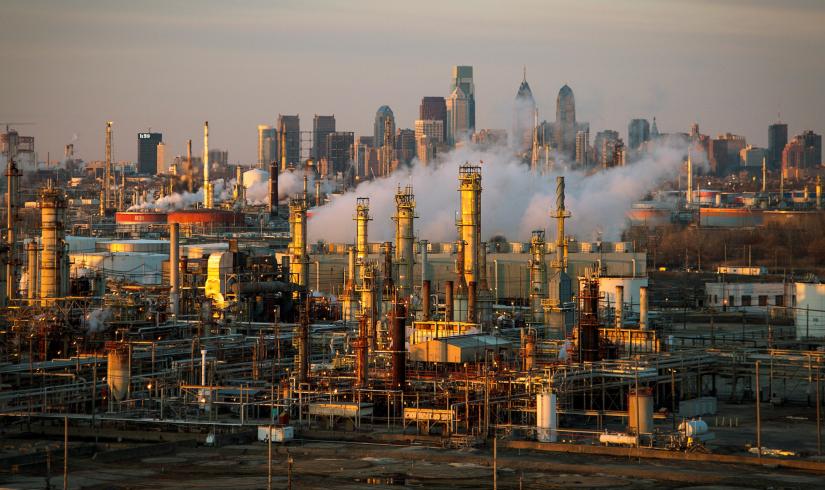 Sluggish consumption growth is depressing oil prices even as Saudi Arabia and its allies try to prop up the market by cutting their production.
Sluggish consumption growth is depressing oil prices even as Saudi Arabia and its allies try to prop up the market by cutting their production.
U.S. refineries have so far this year processed 48 million barrels of crude and other liquids, less than at the same point in 2018, according to an analysis of weekly data from the U.S. Energy Information Administration.
Gross inputs into refineries have averaged 16.90 million barrels per day (bpd) compared with 17.15 million bpd in 2018 (“Weekly petroleum status report”, EIA, July 17).
Refineries had a much heavier and longer maintenance season between February and April than at the same point last year.
Most refiners have not yet made up for the lost production, with daily processing rates mostly below prior year levels.
Even with restricted crude run rates, however, gasoline stocks are just 4 million barrels below 2018 levels while distillate inventories are 15 million barrels above last year.
Refiners have reconfigured their equipment to maximise output of middle distillates and minimise production of residual fuel oil ahead of the introduction of new marine fuel regulations at the start of 2020.
So far production of distillate fuel oil has increased by 115,000 bpd compared with 2018, while gasoline output is also up by 85,000 bpd, as refiners squeeze extra valuable fuels from their raw inputs. Refiners are likely seeking to increase stocks of distillates to ensure adequate stocks at bunkering terminals and smooth the introduction of the new marine fuel rules.
Refiners are likely seeking to increase stocks of distillates to ensure adequate stocks at bunkering terminals and smooth the introduction of the new marine fuel rules.
The heavy maintenance undertaken between February and April should ensure most refineries can undergo lighter than normal maintenance in October and November, boosting fuel supplies even further later in the year.
In theory, heavy crude processing during the second half of the year should cut excess crude stocks and help rebalance the market. But the softness of consumption may now be putting that out of reach.
Consumption weakness and rising fuel stocks explain why oil prices have failed to rise in recent weeks despite diplomatic tensions in the Middle East Gulf and a slowdown in new well drilling in the United States.
John Kemp is a Reuters market analyst specialising in oil and energy. Before joining Reuters in 2008, he was an analyst for Sempra Commodities, now part of JP Morgan and Mercuria. He holds a degree in Philosophy, Politics and Economics from the University of Oxford.
 Opinion
Opinion
30759 hour(s) 49 minute(s) ago ;
Morning 10:44 ; Saturday ; Apr 20, 2024
Bulging fuel stocks put spotlight on slack oil consumption
Send
John Kemp
Published : 23:14, Jul 19, 2019 | Updated : 23:19, Jul 19, 2019
Published : 23:14, Jul 19, 2019 | Updated : 23:19, Jul 19, 2019
0 ...0 ...
/hb/
***The opinions, beliefs and viewpoints expressed in this article are those of the author and do not reflect the opinions and views of Bangla Tribune.
- KOICA donates medical supplies to BSMMU
- 5 more flights to take back British nationals to London
- Covid19: Rajarbagh, Mohammadpur worst affected
- Momen joins UN solidarity song over COVID-19 combat
- Covid-19: OIC to hold special meeting
- WFP begins food distribution in Cox’s Bazar
- WFP begins food distribution in Cox’s Bazar
- 290 return home to Australia
- Third charter flight for US citizens to return home
- Dhaka proposes to postpone D8 Summit
Unauthorized use of news, image, information, etc published by Bangla Tribune is punishable by copyright law. Appropriate legal steps will be taken by the management against any person or body that infringes those laws.
Bangla Tribune is one of the most revered online newspapers in Bangladesh, due to its reputation of neutral coverage and incisive analysis.
F R Tower, 8/C Panthapath, Shukrabad, Dhaka-1207 | Phone: 58151324; 58151326, Fax: 58151329 | Mob: 01730794527, 01730794528


